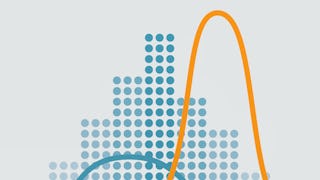Ce cours s'adresse aux data scientists et aux statisticiens, qu'ils soient en activité ou qu'ils aspirent à le devenir. Il s'agit du quatrième cours d'une série de quatre introduisant les principes fondamentaux de la statistique bayésienne. Il s'appuie sur les cours Statistiques bayésiennes : Du concept à l'analyse des données, Techniques et modèles, et Modèles de mélange.



Statistiques bayésiennes : Analyse des séries temporelles
Ce cours fait partie de Spécialisation Statistiques bayésiennes

Instructeur : Raquel Prado
4 961 déjà inscrits
Inclus avec 
(16 avis)
Expérience recommandée
Ce que vous apprendrez
Construire des modèles qui décrivent les dépendances temporelles.
Utilisez R pour l'analyse et la prévision des séries temporelles.
Expliquez les processus de séries temporelles stationnaires.
Compétences que vous acquerrez
- Catégorie : Mathématiques
Détails à connaître

Ajouter à votre profil LinkedIn
10 devoirs
Découvrez comment les employés des entreprises prestigieuses maîtrisent des compétences recherchées


Élaborez votre expertise du sujet
- Apprenez de nouveaux concepts auprès d'experts du secteur
- Acquérez une compréhension de base d'un sujet ou d'un outil
- Développez des compétences professionnelles avec des projets pratiques
- Obtenez un certificat professionnel partageable




Obtenez un certificat professionnel
Ajoutez cette qualification à votre profil LinkedIn ou à votre CV
Partagez-le sur les réseaux sociaux et dans votre évaluation de performance


Il y a 5 modules dans ce cours
Ce module définit les processus de séries temporelles stationnaires, la fonction d'autocorrélation et le processus autorégressif d'ordre un ou AR(1). L'estimation des paramètres via le maximum de vraisemblance et l'inférence bayésienne dans le processus AR(1) sont également abordés.
Inclus
9 vidéos12 lectures4 devoirs1 évaluation par les pairs
Ce module étend les concepts appris dans la semaine 1 sur le processus AR(1) au cas général de AR(p). L'estimation du maximum de vraisemblance et l'inférence bayésienne a posteriori dans le processus AR(p) sont discutées.
Inclus
9 vidéos8 lectures2 devoirs1 évaluation par les pairs
Les modèles linéaires dynamiques normaux (NDLM) sont définis et illustrés dans ce module à l'aide de plusieurs exemples. La construction de modèles basés sur la fonction de prévision via le principe de superposition est expliquée. Les méthodes de filtrage, de lissage et de prévision bayésiennes pour les NDLM dans le cas de variances d'observation connues et de matrices de covariance de système connues sont discutées et illustrées.
Inclus
10 vidéos7 lectures2 devoirs1 évaluation par les pairs
Inclus
7 vidéos4 lectures2 devoirs1 évaluation par les pairs
Dans ce projet final, vous utiliserez des modèles linéaires dynamiques normaux pour analyser un ensemble de données de séries temporelles téléchargées à partir de Google trend.
Inclus
1 évaluation par les pairs
Instructeur

Offert par
Recommandé si vous êtes intéressé(e) par Probabilités et Statistiques


University of California, Santa Cruz


University of California, Santa Cruz


Duke University


University of California, Santa Cruz
Pour quelles raisons les étudiants sur Coursera nous choisissent-ils pour leur carrière ?




Avis des étudiants
16 avis
- 5 stars
75 %
- 4 stars
0 %
- 3 stars
18,75 %
- 2 stars
0 %
- 1 star
6,25 %
Affichage de 3 sur 16
Révisé le 5 févr. 2024
It was a nice course, but it would be better if there were more supplementary materials for the proof and theoretical discussion.



Ouvrez de nouvelles portes avec Coursera Plus
Accès illimité à 10,000+ cours de niveau international, projets pratiques et programmes de certification prêts à l'emploi - tous inclus dans votre abonnement.

Faites progresser votre carrière avec un diplôme en ligne
Obtenez un diplôme auprès d’universités de renommée mondiale - 100 % en ligne

Rejoignez plus de 3 400 entreprises mondiales qui ont choisi Coursera pour les affaires
Améliorez les compétences de vos employés pour exceller dans l’économie numérique
Foire Aux Questions
L'accès aux cours et aux devoirs dépend de votre type d'inscription. Si vous suivez un cours en mode audit, vous pourrez consulter gratuitement la plupart des supports de cours. Pour accéder aux devoirs notés et obtenir un certificat, vous devrez acheter l'expérience de certificat, pendant ou après votre audit. Si vous ne voyez pas l'option d'audit :
Il se peut que le cours ne propose pas d'option d'audit. Vous pouvez essayer un essai gratuit ou demander une aide financière.
Le cours peut proposer l'option "Cours complet, pas de certificat" à la place. Cette option vous permet de consulter tous les supports de cours, de soumettre les évaluations requises et d'obtenir une note finale. Cela signifie également que vous ne pourrez pas acheter un certificat d'expérience.
Lorsque vous vous inscrivez au cours, vous avez accès à tous les cours de la Specializations, et vous obtenez un certificat lorsque vous terminez le travail. Votre certificat électronique sera ajouté à votre page de réalisations - de là, vous pouvez imprimer votre certificat ou l'ajouter à votre profil LinkedIn. Si vous souhaitez uniquement lire et visualiser le contenu du cours, vous pouvez auditer le cours gratuitement.
Si vous vous êtes abonné, vous bénéficiez d'une période d'essai gratuite de 7 jours pendant laquelle vous pouvez annuler votre abonnement sans pénalité. Après cette période, nous ne remboursons pas, mais vous pouvez résilier votre abonnement à tout moment. Consultez notre politique de remboursement complète.

